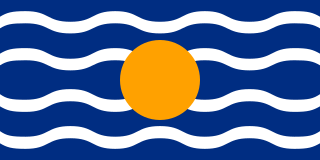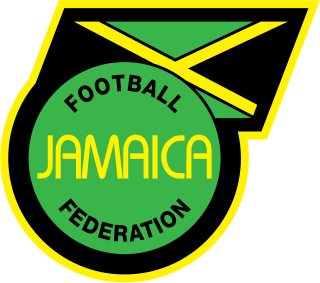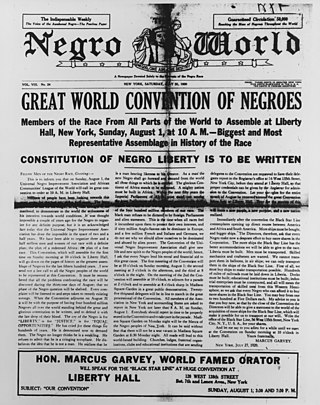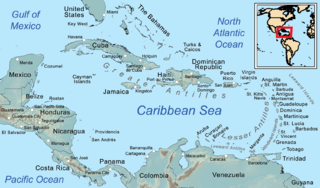Related Research Articles

The West Indies Federation, also known as the West Indies, the Federation of the West Indies or the West Indian Federation, was a short-lived political union that existed from 3 January 1958 to 31 May 1962. Various islands in the Caribbean that were part of the British Empire, including Trinidad and Tobago, Barbados, Jamaica, and those on the Leeward and Windward Islands, came together to form the Federation, with its capital in Port of Spain, Trinidad and Tobago. The expressed intention of the Federation was to create a political unit that would become independent from Britain as a single state — possibly similar to Canada, the Federation of Australia, or the Central African Federation. Before that could happen, the Federation collapsed due to internal political conflicts over how it would be governed or function viably. The formation of a West Indian Federation was encouraged by the United Kingdom, but also requested by West Indian nationalists.
Winston Bernard Coard is a Grenadian politician who was Deputy Prime Minister in the People's Revolutionary Government of the New Jewel Movement. Coard launched a coup within the revolutionary government and took power for three days until he was himself deposed by General Hudson Austin.

The Jamaica national football team, nicknamed the "Reggae Boyz", represents Jamaica in international football. The team's first match was against Haiti in 1925. The squad is under the supervising body of the Jamaica Football Federation (JFF), which is a member of the Caribbean Football Union (CFU), Confederation of North, Central American and Caribbean Association Football (CONCACAF), and the global jurisdiction of FIFA. Jamaica's home matches have been played at Independence Park since its opening in 1962.
Indo-Caribbeans or Indian-Caribbeans are people in the Caribbean who are descendants of the Jahaji indentured laborers from India and the wider subcontinent, who were brought by the British, Dutch, and French during the colonial era from the mid-19th century to the early 20th century. A minority of them are descendants from people who immigrated as entrepreneurs, businesspeople, merchants, engineers, doctors, religious leaders and other professional occupations beginning in the mid-20th century.
Afro-Trinidadians and Tobagonians are people from Trinidad and Tobago who are of Sub-Saharan African descent, mostly from West Africa. Social interpretations of race in Trinidad and Tobago are often used to dictate who is of West African descent. Mulatto-Creole, Dougla, Blasian, Zambo, Maroon, Pardo, Quadroon, Octoroon or Hexadecaroon (Quintroon) were all racial terms used to measure the amount of West African ancestry someone possessed in Trinidad and Tobago and throughout North American, Latin American and Caribbean history.

The University of the West Indies (UWI), originally University College of the West Indies, is a public university system established to serve the higher education needs of the residents of 18 English-speaking countries and territories in the Caribbean: Anguilla, Antigua and Barbuda, The Bahamas, Barbados, Belize, Bermuda, British Virgin Islands, Cayman Islands, Dominica, Grenada, Guyana, Jamaica, Montserrat, Saint Kitts and Nevis, Saint Lucia, Saint Vincent and the Grenadines, Trinidad and Tobago, and Turks and Caicos Islands. Each country is either a member of the Commonwealth of Nations or a British Overseas Territory. The aim of the university is to help "unlock the potential for economic and cultural growth" in the West Indies, thus allowing improved regional autonomy. The university was originally instituted as an independent external college of the University of London.

Negro World was the newspaper of the Marcus Garvey's Universal Negro Improvement Association and African Communities League (UNIA). Founded by Garvey and Amy Ashwood Garvey, the newspaper was published weekly in Harlem, and distributed internationally to the UNIA's chapters in more than forty countries. Distributed weekly, at its peak, the Negro World reached a circulation of 200,000.

Hubert Henry Harrison was a West Indian-American writer, orator, educator, critic, race and class conscious political activist, and radical internationalist based in Harlem, New York. He was described by activist A. Philip Randolph as "the father of Harlem radicalism" and by the historian Joel Augustus Rogers as "the foremost Afro-American intellect of his time." John G. Jackson of American Atheists described him as "The Black Socrates".
Afro-Caribbean people or African Caribbean are Caribbean people who trace their full or partial ancestry to sub-Saharan Africa. The majority of the modern Afro-Caribbean people descend from the Africans taken as slaves to colonial Caribbean via the trans-Atlantic slave trade between the 15th and 19th centuries to work primarily on various sugar plantations and in domestic households. Other names for the ethnic group include Black Caribbean, Afro or Black West Indian or Afro or Black Antillean. The term Afro-Caribbean was not coined by Caribbean people themselves but was first used by European Americans in the late 1960s.

The African Blood Brotherhood for African Liberation and Redemption (ABB) was a U.S. black liberation organization established in 1919 in New York City by journalist Cyril Briggs. The group was established as a propaganda organization built on the model of the secret society. The group's socialist orientation caught the attention of the fledgling American communist movement and the ABB soon evolved into a propaganda arm of the Communist Party of America. The group was terminated in the early 1920s.
Samuel Haynes was a Belizean soldier, activist and poet best known for writing the national anthem of Belize, Land of the Free.

As an overseas department of France, Martinique's culture is French and Caribbean. Its former capital, Saint-Pierre, was often referred to as the Paris of the Lesser Antilles. The official language is French, although many Martinicans speak a Creole patois. Based in French, Martinique's Creole also incorporates elements of English, Spanish, Portuguese, and African languages. Originally passed down through oral storytelling traditions, it continues to be used more often in speech than in writing.
Dame Hilda Louisa Bynoe, DBE was the Governor of Grenada between 1967 and 1972.

The Caribbean is a subregion of the Americas that includes the Caribbean Sea and its islands, some of which are surrounded by the Caribbean Sea and some of which border both the Caribbean Sea and the North Atlantic Ocean; the nearby coastal areas on the mainland are often also included in the region. The region is southeast of the Gulf of Mexico and the North American mainland, east of Central America, and north of South America.
Kithson Anthony Bain is a Grenadian footballer currently playing for Caledonia AIA in the Trinidad and Tobago Premier League. He has been capped at full international level by the Grenada national football team.

Afro-Panamanians are Panamanians of African descent. The Afro-Panamanian population can be mainly broken into one of two categories "Afro-Colonials", Afro-Panamanians descended from slaves brought to Panama during the colonial period, and "Afro-Antilleans," West Indian immigrant-descendants with origins in Trinidad, Martinique, Saint Lucia, Guadeloupe, Dominica, Grenada, Haiti, Belize, Barbados, and Jamaica, whose ancestors were brought in to build the Panama Canal. Afro-Panamanians can be found in the towns and cities of Colón, Cristóbal and Balboa, the Río Abajo area of Panama City, the Canal Zone and the province of Bocas del Toro.

The British West Indies Regiment was a unit of the British Army during the First World War, formed from volunteers from British colonies in the West Indies.

The British Caribbean Football Association were a football association formed in January 1957. The BCFA was formed having witnessed the success of the West Indies Cricket team in the 1950s and their defeat of England during the decade. The BCFA was not technically a West Indies team as players were also selected from British Guiana who were not members of the West Indies Federation
For a history of Afro-Caribbean people in the UK, see British African Caribbean community.
Paulina Pedroso was the most prominent female leader in the Cuban War of Independence. She worked directly with José Martí.